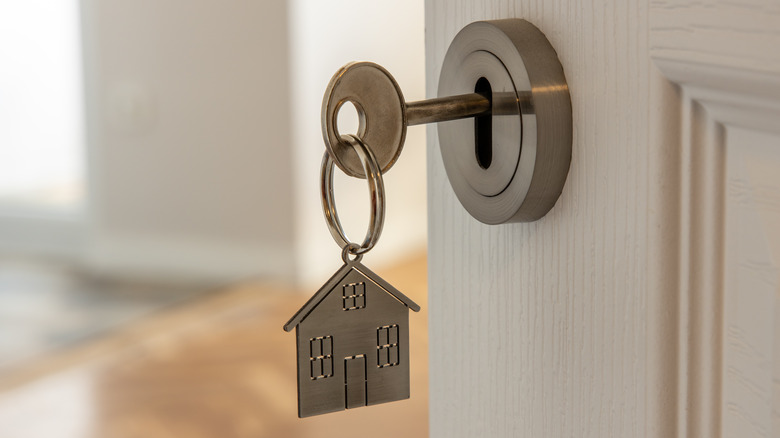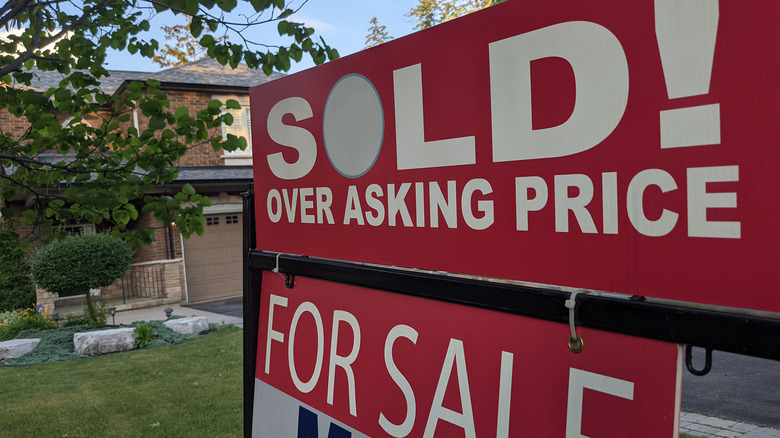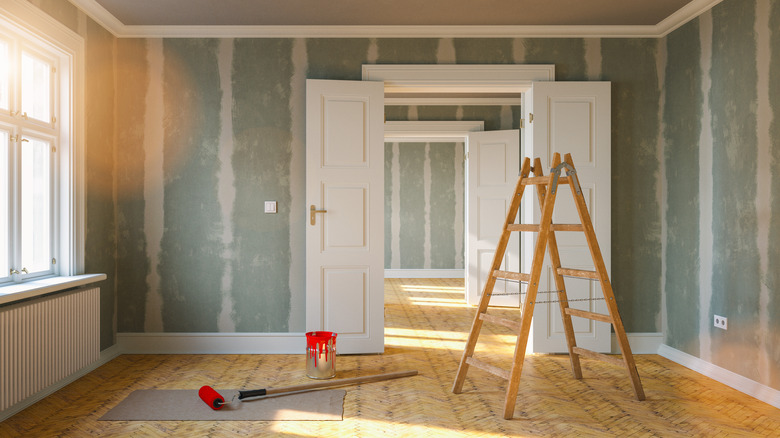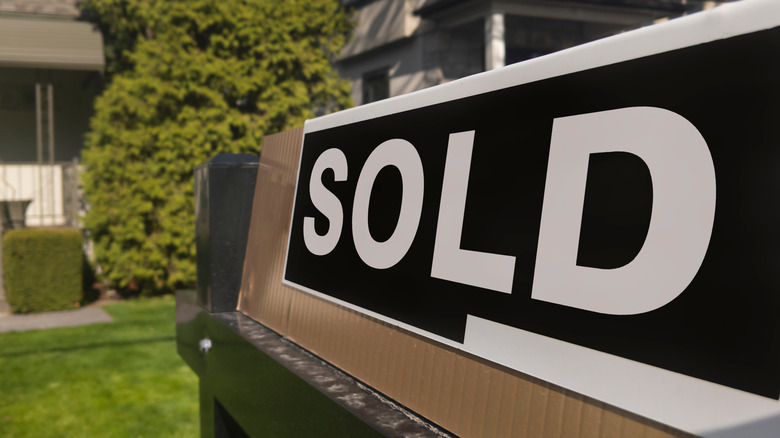Reasons You Should & Shouldn't Buy A Home In 2021
Homebuyers in 2021 are faced with a competitive market, but some good reasons to buy. While it can be tough to nail down an accepted offer on a home you love, interest rates are at historic lows and rising home prices mean it could be a good time to lock in a home purchase.
Why should you buy? "Low interest rates continue to define the home buying process," Brandon Snyder of Selling With The Snyders Group in Katy, Texas told House Digest. But on the other hand, "low inventory is causing a sellers market where there are more buyers than sellers," he shared. Basically, this can make scoring a deal on a home pretty difficult.
If you're not ready to ride the financial and emotional rollercoaster of the 2021 home market, you might want to sit things out until inventory improves. But if you're ready to buy and can make a competitive offer, 2021 could be your year.
Should: Mortgage rates will only go up from here
Interest rates saw historic lows in 2020, and many homeowners took advantage of the opportunity to lock in a low rate on a mortgage on a new home or refinance. But don't expect this trend to stick. Extremely low rates aren't likely to be available much longer — and when they rise, it can increase your total cost of buying a home.
While rates are still low right now, experts expect to see them increase in 2021, according to NextAdvisor. If you're planning to buy a home soon, now is probably the best time to get the lowest rate possible on your mortgage.
Experts don't expect rates to "shoot up overnight," though. It's more likely they'll slowly rise. While it's not an emergency to lock in a low rate right this second, it is a good idea to do it sooner than later if you're concerned about an ideal interest rate.
Should not: Home prices are rapidly rising and you might overpay
As home prices rise rapidly in some areas of the U.S., it's easy to get wrapped up in bidding wars and homes selling for well over asking price. Getting caught up in the hot home sales market could have you paying more than you'd planned on. You might even be priced out of the home you really want or have to lower your expectations. Yes, interest rates are low and you should take advantage of them if it makes sense and you're in a position to buy, but saving on interest doesn't help a whole lot if you pay too much for your home.
That said, if you're waiting for a market dip to buy, don't count on it. As NextAdvisor reported, experts say the fundamentals that led to the 2008 housing market crash are not the same as what's driving higher home prices today. Then, it was subprime mortgages and overleveraging. Now, it's low interest rates and low inventory of available homes.
Should: You can get top dollar for your current home
With low housing inventory in many locations throughout the U.S., we're in a seller's market. That means you've got the upper hand when negotiating the sales price for your current home. Compare your home's value to similar homes sold in your area, and you might find it could sell for more than you think. Many homes sold recently are going for asking price or more, sparking bidding wars with intense competition.
Even as inventory lifts and sales slow down, prices are expected to rise, according to Forbes. Home price growth in 2021 is expected to be slower than it was in 2020, but it's thought that there will still be new highs for home prices. You could find a new home at a good price and interest rate, and then sell your current home at a record high — though it could be difficult to find an affordable new home, so you'll probably want to secure one before selling.
Should not: You're competing against buyers waiving contingencies
As many housing markets have more buyers than homes, homebuyers are getting creative with their offers. A nice letter about how much you love the home doesn't sway many sellers anymore — these days, an offer waiving contingencies is more likely to get a seller's attention.
As reported by Marketplace, many homebuyers are finding themselves in bidding wars with buyers who have no contingencies – which waives the buyer's right to renegotiate or exit the home-buying deal without losing money. Buyers might want contingencies for an appraisal that comes in below the sale price or if an inspection uncovers major repair needs.
A good real estate agent can help you weigh the risk of waiving contingencies. On one hand, you could get priority consideration from sellers. On the other, you could lose thousands if you decide to walk away or if the home requires more renovation than you'd previously thought. You'll have to calculate whether the value of the earnest money you could lose is worth it to submit a more competitive offer.
Should: You can sell your current home instead of renovating it
Want to sell your home, but you're not ready to take on the headaches of pre-sale renovations? You might just skip ahead to the sale. With a tight housing market, buyers can't afford to be choosy. While you might get more money out of your home sale after renovating, you can probably still find a buyer for your home without having to make major changes, according to Mansion Global.
You may find value in just fixing up a few things instead of doing a major renovation. Consider the cost compared to the potential increase in value — your return on investment (via The Balance). Curb appeal sells, so a fresh coat of paint or new landscaping could potentially boost your sales price without a lot of upfront expense.
While some buyers are waiving inspections, it's a good idea to repair any glaring issues like a broken window or cracks in the walls that could turn off even buyers willing to bargain. If your home is in really bad shape and has major issues with plumbing or the electrical system, structural damage, or mold, you may prefer to sell as is and price it appropriately, so the new owners can renovate and repair the home themselves.
Should not: Stretching your house budget could have a ripple effect
As home values rise and you encounter tough bidding wars on homes, you might decide to increase your housing budget. That could help you snag a home that was out of reach. However, buying a home that exceeds affordability isn't worth rushing for and it could be a homebuying mistake that will cost you a fortune. Buying a home that puts you in a position with low liquid assets such as cash is known as "house rich, cash poor," according to Realtor.com. In this situation, your home equity may take up much of your net worth and you may have a high debt-to-income ratio. And you may have less than six months of expenses saved in your bank account.
One bad "house rich, cash poor" situation could be if you're unable to afford maintenance or emergency repairs on your home. Spending more than you can afford on a home could require you to cut back elsewhere like your car, travel, or food budgets. If you can't cut back, you might be tempted to overspend into debt.
If your budget and home prices don't line up right now, it may be a good idea to wait until circumstances change, like after you get a raise or move to an area with a lower cost of living.
Should: Home values are appreciating
New homeowners could get the benefit of instant appreciation. According to a Radian Home Price Index report, as shared by Business Wire, annual home price appreciation is now at its "highest levels since before COVID lockdowns began." As your home appreciates in value, you could sell it for a higher price or qualify for a larger home equity loan.
You might not be very concerned with home values if you're planning to stay in your home for at least a few years, but rising home values could offer a financial boost even if you have no plans to sell. If you put down less than 20% and are subject to private mortgage insurance payments, as U.S. News & World Report shared, you can request to drop PMI once your house appraises for a loan-to-value ratio of 80% or less. The higher your home's value rises, the lower your LTV ratio and the closer you are to removing PMI payments.
Should not: Your dream home might be sold out from under you
It's a tight market, and homes are moving fast in many U.S. markets this year. If you take even a couple days to mull over the merits of a potential home, you might miss out to buyers who move faster and submit a competitive offer. That makes 2021 a tough year if you're a homebuyer who easily falls in love with homes.
While most homebuyers have some emotion in the buying process, you might want to sit this year out if you're not prepared to be heartbroken over a home that got away, as noted by The Atlantic. Even if you can take the heartache, it's important to not let emotions get the best of you when making an offer. Finding a home you love could lead you to submit an offer that exceeds your budget — especially if you've missed out on others before and don't want to let it slip away.
Should: You may have more options if you work from home now
If you're able to work from home, you might look at areas that you hadn't considered previously. Looking into another area could help you find a good home priced well, especially if your search has been limited by proximity to work. With limited inventory, the ability to expand your search to the suburbs or beyond could mean the difference between finding a home and impatiently waiting on inventory.
A Homes.com survey found that more people are moving out of cities and into suburbs. According to the survey, nearly three out of four people who moved or were planning to in order to work from home don't plan to move back to the homes they had before the 2020 pandemic started. And 45% of those surveyed would move if they had the opportunity to work remotely.
Keep an eye out for WFH-friendly features, such as space for a home office or larger square footage.
Should not: Intense bidding wars price houses higher than appraised value
Some homebuyers try for months to buy a home, only to be outbid on home after home. As bidding wars break out, prices are hitting record highs. You could end up in a situation where you need to submit a high bid — but that bid could put you over the appraised value, as noted by American Home Agents.
When you agree to an offer that's over the appraised value of the home, financing gets more difficult. Most mortgage companies won't finance more than what an appraisal says the home is worth. If you want to buy the home above appraised value, you'll typically have to come up with cash to make up the difference. You could ask the seller to reduce the price to appraised value, but they might prefer to move on to another buyer willing to pay the difference.
And even if you can afford to pay above appraisal, that doesn't mean you should — you'll have more money tied up in the home purchase than it's worth if you needed to sell it.
Should: A home can offer more room to spread out
If you spent much of 2020 in a space without a lot of room or private outdoor access, you may have felt a little closed in. A home could upgrade your space, offering more room to spread out — maybe even into a backyard!
Becoming a homeowner means you are free to transform your living space to suit your needs. HomeAdvisor's 2020 State of Home Spending report found that many homeowners prioritized making homes more comfortable as they spent more time at home in 2020. Spending more time at home means more wear and tear — and the potential to spot problems in the home. Outdoor living needs increased 27% in 2020, and many have found new uses for existing home spaces, such as finding a room for a home office. Outdoor updates, including landscaping and painting, were popular home improvement projects — and homeowners prioritized renovating kitchens for more cooking at home.
Should not: Your finances will be heavily scrutinized
During the coronavirus pandemic, many people lost jobs or had a change in their finances, which led to higher lender scrutiny. Mortgage companies were — and still are — concerned with lending to home buyers with stable jobs that can afford to pay back loans for the long term.
Mortgage underwriting is often an invasive process as you submit financial documents and confirm your work status. But now, lenders go above previous standards, according to U.S. News & World Report. If your finances don't line up with what you've submitted on an approved application, your loan could be rejected and put your closing in jeopardy.
Expect your employment to be verified multiple times before closing. If you're self-employed, you'll need to show years of successful business and proof that your business is in good standing. The underwriting process can take weeks — even a month or more — to get a clear to close.
Should: Renting may become more expensive
A rising real estate market means rent is rising in many areas right along with home sales prices. Some cities with high demand are seeing major increases in the costs of rent this year.
An Insurify report on the U.S. cities with surging rent values in 2021 found that, while the average percent change in rent was a stable 0.42%, some cities experienced much higher rises in rent costs. The highest increases in rent costs are commonly coastal — 7 of the 20 cities with the greatest rise in rent are in Florida and three are in California. Palm Beach Gardens, Florida and Lake Charles, Louisiana both had more than a 10% rise in rent values at 10.55% and 10.26% respectively.
If you're in an area with rising rent costs and coming up on a lease renewal, you could avoid higher rent by purchasing a home instead.
Should not: You might need a lot of cash
The housing market is seeing some all-cash offers – more than what's normal among first-time homebuyers, as CBS News reported. Most years, less than 10% of first-time homebuyers make an all-cash home purchase. This year, around 15% of them did.
An all-cash offer is tough to compete against — unless you're willing to pay cash, too, or make a higher offer than a cash buyer does. Sellers may prefer all-cash offers, even ones lower than financed offers because they are much easier transactions. Cash offers are typically faster and require fewer potential roadblocks to completing the sale, like lender-required appraisals and inspections.
Some buyers are making cash offers, closing, and then financing after the fact. Of course, an all-cash offer usually requires that you have the cash upfront. However, some services, such as Flyhomes, make cash offers on behalf of the buyer and then finance the home for them.














